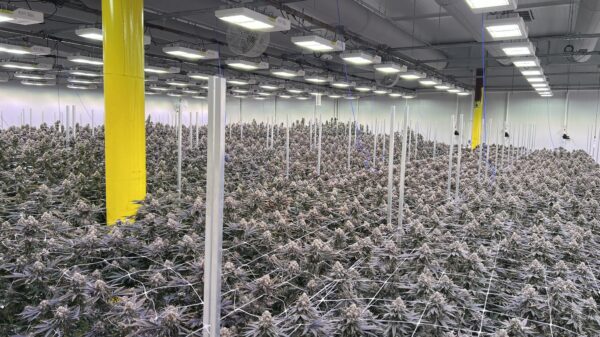A Canadian doctor with more than a decade of emergency room experience says he sees more issues with Tide Pod ingestions among youth than the number of cannabis overdoses, which are quite minor.
Dr. Ian Mitchell said cannabis overdoses overall are generally not a big cause for concern compared to other intoxicants. And when they happen, it’s from potent, unregulated edibles.

Emergency room doctor Ian Mitchell says cannabis is remains overly stigmatized among Canada’s medical professional community. Photo courtesy of Dr. Ian Mitchell
“We see far more alcohol overdoses than we see cannabis overdoses and they can be much more serious and certainly involve a lot more trauma,” Mitchell said in a phone interview with Mugglehead.
Even though Mitchell says alcohol is a more potent toxin than the THC found in cannabis, he does say bad things can still happen with cannabis.
Read more: Weed a ‘lower risk substance’ than tobacco, alcohol: Health Minister briefing
People come in feeling paranoid, nauseated and dizzy when they come into a hospital after eating too much cannabis, he said.
“So we just keep an eye on them and wait for the symptoms to wear off. But there’s not really anything active to do,” Mitchell added.
His comments underscore a current debate surrounding cannabis edibles.
Mitchell has called out his peers at large for spreading misinformation about the THC-infused products.
After the Canadian Medical Association Journal published an article this month that issued several warnings on the dangers of cannabis edibles, it drew international headlines from the likes of CNN and Newsweek.
But Mitchell said the CMAJ researchers failed to mention a single positive aspect of cannabis legalization, and those professionals even had spread a myth that has been perpetuated by the Trump administration.
“The whole tone of the article was particularly negative,” Mitchell said. “But really what we’re seeing now is a movement from an unregulated source to a now-regulated source, which really should only improve safety and consumer confidence.”
Canadian regulations for cannabis edibles, beverages, vapes and topicals came into effect last October — a year after cannabis flower, oil, plants and seeds were legalized for recreational use.
While Mitchell argues legalization makes cannabis safer, he says the article is “fear-mongering” by focusing exclusively on the harms of cannabis, including a litany of warnings on the potential dangers of cannabis edibles for children, seniors and pets.
Authors Jasleen Grewal and Lawrence Loh — both physicians and researchers at the University of Toronto — also cautioned that illicit cannabis edibles could be contaminated with dangerous or deadly narcotics like fentanyl.
But Mitchell said there hasn’t been a single confirmed case of narcotic contamination in cannabis products despite the serious warning.
“That’s a myth that’s been propagated by a number of people such as Trump officials and the (former) Premier of British Columbia, Christy Clark,” he said.
https://twitter.com/travels2little/status/1214214658296446977?ref_src=twsrc%5Etfw%7Ctwcamp%5Etweetembed%7Ctwterm%5E1214214658296446977&ref_url=https%3A%2F%2Fwinnipeg.citynews.ca%2F2020%2F01%2F09%2Fdoctor-canadian-medical-association-edibles%2F
Doctor’s debate deepens
Mitchell has blasted the article on Twitter and in the media since it was published early January.
He also co-wrote a response in the CMAJ with Zach Walsh, an associate professor of psychology at the University of British Columbia. The two argued that claiming imaginary harms of cannabis equates to the reefer madness of the 1940s. They also wrote that legalization of edibles should be celebrated among health officials because they offer Canadians a safer alternative to inhaling cannabis smoke.
Grewal and Loh replied back this week arguing that while Walsh and Mitchell choose to debate aspects of potential contamination of edibles, that does not negate the risks of overconsumption and accidental ingestion.

Health Canada permits cannabis edibles to contain a maximum of 10 milligrams of THC per package. Photo courtesy of Canopy Growth Corp.
But Mitchell said those fears are mainly borne out of misleading data collected from Colorado, which legalized cannabis and edible products in 2014.
He said critics often cite how emergency room visits increased since legalization in the state, in particular adolescent visits, which rose to 4.9 per 1,000 visits in 2015 from 1.8 per 1,000 visits in 2009.
However, Mitchell said detractors fail to mention how Colorado didn’t start out with regulations on THC potency and packaging of edibles. He said unaware tourists would be coming from nearby states where cannabis was still illegal and eat a whole chocolate bar containing 100 milligrams of THC, which was supposed to be divided into 10 servings.
In Canada, cannabis edibles can only contain 10mg of THC per package, and they must be sealed in plain, child-resistant packaging.
“We’ve learned from Colorado’s experience so I’m expecting to see relatively not as much of an increase in emergency room visits in Canada,” Mitchell said.
Despite Canada’s more cautious approach, Mitchell says stigmatization remains very strong in the medical professional world.
Dr. Anita Srivastava, an associate professor at the University of Toronto, also wrote a negative article on edibles this month that’s been republished by the mainstream media. It focuses mainly on the potential dangers of young people overdosing on the new products.
“That physician has been writing negatively about cannabis for at least 10 years,” Mitchell said. “Her [philosophy] has been that cannabis has no place in the doctor’s office.”
‘Still more difficult to study cannabis than it is to study heroin’: Mitchell
For Mitchell there needs to be more studies on cannabis to educate average Canadians and doctors alike.
“The problems is that the science of cannabis in the last four decades has been prominently focused on the harms, so the literature supporting harms has been about 90 per cent and the literature supporting benefits has only been about 10 per cent,” he said.
Despite legalization, Mitchell said cannabis research remains an uphill battle in Canada.
“It is still more difficult to study cannabis than it is to study heroin,” he said.

Cannabis researchers are frustrated with Health Canada’s research licence requirements, Dr. Ian Mitchell says. Photo courtesy of Deposit Photos
Mitchell said Canada is missing its opportunity to lead the world in cannabis research, and he is calling on the government to speed up the issuing of research licences and increase federal funding for new studies.
A Health Canada spokesperson told Mugglehead it added staff in July to relieve a bottleneck of cannabis research licence applications that have accumulated since October, 2018. It also simplified its application guide, tweaked its review process for projects that involve smaller amounts of cannabis, and introduced an institution-wide licence, where several projects occurring at one institution can be combined under one licence application.
“These changes have resulted in a significant increase in the pace of licensing and have led to efficiencies in the approval process,” the spokesperson said.
As of Jan. 20, the agency had issued 222 research licences — an increase of more than 130 since last summer — and had 196 still in queue, it said.
However, Mitchell said researchers are still turning away from cannabis because the hurdles surrounding security, storage and record-keeping remain too onerous.
“There should be an opening of research and a striking down of all the regulations in a way to make this all easier,” he said. “But we haven’t seen that. We haven’t seen a robust research effort.”
As for funding projects, the Liberal government earmarked $24.5 million last May to fund 26 research projects across Canada, but Mitchell says most of those studies will be focusing on the harms of cannabis.
When Mugglehead asked the federal government if enough resources are being allocated to study the potential benefits and overall science of cannabis, the Canadian Institutes of Health Research responded by saying, “there is nothing specific we can add,” aside from linking to its website.
Online, the CIHR highlights how funding supports both harms and benefits of cannabis, and includes a list of projects that range from mental health, PTSD and pain management.
But Mitchell said public funding is still too scant to accomplish major breakthroughs in cannabis science. He said licensed producers are funding a lot of today’s larger projects.
“We are relying on companies to carry out this research, and that’s a problem because it’s all deemed as biased research and there’s nothing coming out that’s non-biased,” Mitchell said.
Mitchell is one of the researchers working on Canada’s first clinical trial to explore the therapeutic benefits of cannabis in treating PTSD. The UBC study began in 2014 and is funded by B.C.-based Tilray (NASDAQ: TLRY).
“Again, you get lots of public funding if you look at the harms,” he said. “But for those approaching the government to look at the benefits and get some funding, you just can’t. You have to go to a licensed producer.”
Mitchell said in-depth research is the only way to combat the stigmas among his peers.
Although he does see small amounts of progress, he said average Canadians are the ones normalizing cannabis use for now because they’re using it more to treat everything from arthritis to insomnia.
“It’s getting better, but it’s the patients that are really driving the acceptance of cannabis,” he said. “They really are having a higher uptake of cannabis therapy and they’re enjoying their edibles.”
Top image courtesy of Austin Kirk via Wikipedia Commons
jared@mugglehead.com
@JaredGnam















Donald John
February 6, 2020 at 3:43 pm
What a dumb doctor.
People normally don’t eat the pods unless they are dumb!